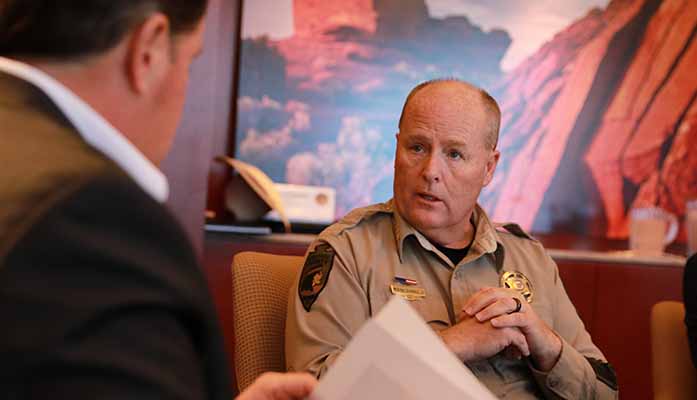
by Terri Jo Neff | Jan 13, 2022 | News
By Terri Jo Neff |
With the introduction of legislation this week in the Arizona House of Representatives to prohibit many public entities from using public funds to pay for ransomware attacks, AZ Free News recently spoke with Sen. David Gowan about the security of the Legislature’s own computer systems.
Gowan says that the dedicated IT staff of the Arizona Legislature have ensured that its system protections are up to date and meet or exceed industry standards. This would allow the legislative session to continue with little impact if hit with the type of ransomware attack suffered by the Virginia Legislature last month.
“Nothing is 100 percent guaranteed, but we try to figure it out before a hacker can,” he said. “And we have the ability to move forward and maneuver, even if we have to do some things on paper.”
The Dec. 10 ransomware attack on servers used by Virginia lawmakers led to the disabling of the legislature’s voicemail system, its budgeting portal, and the platform used to draft bills. Even access to the Virginia Constitution and state code normally accessible online had to be taken down after the attack, which one state official blamed on an “extremely sophisticated malware.”
For a short time the website serving Virginia’s Division of Capitol Police was also down but there was no report of impacts to critical functions.
Whoever hacked the Virginia Legislature’s system left a ransom note, although it did not include a ransom price nor due date, according to a senior staff member. It is the first reported cyber security attack on a state legislature, although at dozens of public entities across the country were hit in 2021.
Gowan is pleased that Arizona’s legislative staff has safeguards in place which will allow lawmakers to “quickly move forward with our work” if hit by an attack like Virginia experienced. He credits the fact that the legislature’s IT personnel conduct refresher training for lawmakers and staff about suspicious emails, which is the easiest way for a cyber attacker to get into a system.
There is also frequent spot checks of the legislature’s systems. And it helps, Gowan noted, that Arizona has one of the nation’s premiere cybersecurity programs, with the Arizona Department of Homeland Security, the Arizona Department of Public Safety, and the Department of Emergency and Military Affairs all major players, along with local and federal agencies.
Two controversial bills recently introduced by a state representative would make significant changes to Arizona’s laws related to cyberattacks. One would tie the hands of public officials in responding to a ransomware attack, while the other seeks to require anyone who does business in Arizona to report a computer security breach or face a civil penalty from the Arizona Attorney General’s Office.
HB2145 would bar the State and any political subdivision of the state (such as a county, city, town, or school district) from making ransomware payments to secure the release of data. It would also require immediate notification of such an attack to the Director of the Arizona Department of Homeland Security.
Meanwhile, HB2146 would mandate anyone who “conducts business in this state and that owns, maintains or licenses unencrypted and unredacted computerized personal information” to report any security system breach to the Director of the Arizona Department of Homeland Security within 45 days.
A willful violation of the notification statute could lead to a civil penalty of up to $500,000, according to the bill.

by Corinne Murdock | Jan 13, 2022 | News
By Corinne Murdock |
A new bill proposes that Arizonans registering to vote must provide proof of citizenship in order to vote in presidential elections and receive early ballots by mail. Federal-only voters aren’t required to provide proof of their citizenship to vote for the president, though they must for state, county, and local elections.
The bill makes an exception for military and overseas voters within the Uniformed and Overseas Absentee Voting Act (UOCAVA).
In the 2020 election, Arizona had over 11,600 federal-only ballots cast: nearly 1,150 more votes than President Joe Biden’s margin that won the state.
The bill also laid out a method for verifying citizenship with the submission of a federal form. Within ten days after receiving the form, election officials must utilize their available resources to verify citizenship as well as search the Arizona Department of Transportation (ADOT) databases, Social Security Administration (SSA) databases, U.S. Citizenship and Immigration Services (USCIS) Systematic Alien Verification for Entitlements (SAVE) Program, National Association for Public Health Statistics and Information Systems (NAPHSIS) Electronic Verification of Vital Events (EVVE) system, and any other state, city, town, county, or federal databases relating to voter registration. Throughout the entire process, elections officials must record their efforts to verify citizenship.
If election officials discover definitive proof that the applicant isn’t a citizen, then they must reject the application and notify the county attorney and attorney general for further investigation. The bill would also require election officials to notify applicants if they are unable to locate confirmation of citizenship, providing applicants 30 days to respond with proof of citizenship. Election officials may not reject an application if the applicant doesn’t provide proof of citizenship within that time frame — at that point, the applicant would only be eligible to vote in federal elections.
Election officials that don’t attempt to verify citizenship when no proof of citizenship is provided would be guilty of a class six felony.
Those who introduced the bill were State Representatives Jake Hoffman (R-Queen Creek), Walt Blackman (R-Snowflake), Neal Carter (R-San Tan Valley), Joseph Chaplik (R-Scottsdale), John Fillmore (R-Apache Junction), Steve Kaiser (R-Phoenix), Teresa Martinez (R-Oro Valley), Quang Nguyen (R-Prescott), Jacqueline Parker (R-Mesa), Ben Toma (R-Peoria), Justin Wilmeth (R-Phoenix).
The bill also proposes other requirements to strengthen voter registration, such as providing proof of residential address and a checkmark specifically next to a detailed question regarding citizenship.
Corinne Murdock is a reporter for AZ Free News. Follow her latest on Twitter, or email tips to corinne@azfreenews.com.

by Terri Jo Neff | Jan 13, 2022 | News
By Terri Jo Neff |
Arizona Gov. Doug Ducey and the majority of Arizona’s sheriffs are tired of waiting for Congress to do something constructive about the unsecured Arizona / Mexico border. So they are joining together to support draft federal legislation which would bolster border security, along what the governor has described as “a patchwork of federal, state, tribal and private lands.”
On Tuesday, 11 of Arizona’s 15 sheriffs took part in the meeting with Ducey to discuss the overwhelming problem of human trafficking and illegal drugs coming across the 372-mile border. After the meeting, the sheriffs in attendance voted to advocate for the legislation drafted by Ducey’s staff in hopes of persuading Sen. Mark Kelly and Sen. Kyrsten Sinema to get on board.
“It’s not just an Arizona problem,” said Pinal County Sheriff Mark Lamb. “It’s an America problem.”
Lamb was joined at the meeting by Apache County Sheriff Joe Dedman, Cochise County Sheriff Mark Dannels, Coconino County Sheriff Jim Driscoll, Gila County Sheriff Adam Shepherd, Graham County Sheriff P.J. Allred, Greenlee County Sheriff Tim Sumner, La Paz County Sheriff William Ponce, Mohave County Sheriff Doug Schuster, Navajo County Sheriff David Clouse, and Yavapai County Sheriff David Rhodes.
Ducey’s meeting with the sheriffs came one day after his State of the State address to the Arizona Legislature.
“In Arizona, we will secure our border. We will protect public safety. We will not back down,” Ducey said in his speech. “We will fight this fight until Washington, D.C. finally acts.”
The governor used his State of the State address to highlight his commitment to a multifaceted, coordinated border security effort.
“No member of the Arizona congressional delegation that actually cares about the safety of our communities should vote ‘yes’ on any legislation until the president agrees to language that does the following: secures our border with a wall, a physical barrier and virtual surveillance; increases resources to the local communities that have been devastated by these dangerous open border policies; and makes it clear that our border is not open to illegal immigration,” Ducey said Monday before going on to call out Kelly and Sinema by name.
Just two weeks ago, Dannels and Yuma County Sheriff Leon Wilmot met with new CBP Commissioner Chris Magnus and U.S. Border Patrol leaders to discuss the border.
“In short, we shared our frustration with the lack of shared action plans and no-end being in sight,” Dannels told AZ Free News of the Dec. 28 meeting. “I asked what this administration’s end-game was. I received no answer.”
Dannels said local law enforcement officials, which included San Luis Police Chief Richard Jessup, commended the dedicated CBP officers and USBP agents working the border under such challenging circumstances.
“I asked Commissioner Magnus to provide supportive leadership to these officers and agents during this crisis,” Dannels said.

by Corinne Murdock | Jan 12, 2022 | News
By Corinne Murdock |
President Joe Biden’s border crisis hasn’t slowed down in the least, as was made apparent by recent evidence that illegal immigrant detention centers continue to be well over their capacity nearly a year after his administration began. Last week, leaked photos given to the Washington Examiner revealed the current state of one Yuma detention center. The pictures depict accommodations akin to those used by the hoards of homeless overcrowding deep blue cities like San Francisco, California, or Seattle, Washington: illegal immigrants huddled under makeshift tarp tents, touching elbows in areas with standing room only, nestled shoulder to shoulder with their belongings along hallways, or packed together on floors to sleep in space blankets.
Insiders involved with the detention center reported that the number of those detained surpassed the space available inside for the nighttime, forcing illegal immigrants to sleep outside under the makeshift tents in the freezing or near-freezing weather outdoors.
The insiders further informed the Washington Examiner that Biden’s border crisis upended the normal ebb and flow of illegal immigration: the usual easing up of illegal crossings around the holidays didn’t occur last year.
Border Patrol Yuma Sector union President Rafa Rivera told the news outlet that no CDC guidelines can be followed due to overcrowding.
Former Arizona Supreme Court Justice Andrew Gould explained to AZ Free News that the detention facility numbers seen currently are two to four times normal capacity; under normal circumstances, the sites cost taxpayers about $8 million a month in operational expenses.
Gould added that the overcrowding has minimized some in recent weeks — from around 3,000 to 1,200 thanks to greater efforts by law enforcement to secure the border. Authorities were prompted to take further action as illegal immigrants were trampling the area’s agricultural fields as they traveled. Yuma County serves as one of the nation’s premiere suppliers in winter produce, calling itself the “winter vegetable capital of the world.”
“90 percent of the [winter] produce in the country comes out of Yuma. It’s a critical area for food and food safety and producing food,” said Gould. “The illegal immigrants are basically trampling down crops in fields. Not only are they destroying crops but they’re crops that are highly regulated. Preventing any type of contamination in those fields is important because it puts our food supply at risk.”
Gould also pointed out that many illegal immigrants, especially those from Mexico, don’t have access to good health care. He explained that the detained expose border patrol and any others present to serious disease like tuberculosis, on top of COVID-19. He questioned why the Occupational Safety and Health Administration (OSHA) has focused on all other workplaces, especially throughout the pandemic, but hasn’t intervened with these detention centers.
“Nationwide, OSHA is mandated to protect workplace safety but I haven’t seen anything about OSHA about the workplace conditions of border patrol agents workpace sites,” mused Gould.
It’s not just the temperatures and sanitary issues, especially with the ongoing COVID-19 outbreak, that have caused concern. Illegal Haitian immigrants have become increasingly violent as they continue to be deported back to Haiti, causing fights on the deportation flights or resisting arrest along the border.
Overcrowding in deportation centers shouldn’t come as a surprise, given that the number of encounters experienced over the course of days has equaled or surpassed what authorities would experience in a month or more.
As AZ Free News reported, Yuma Mayor Douglas Nicholls declared a state of emergency early last month after authorities captured the number of illegal immigrants normally apprehended in a month’s time in five days: over 6,000 illegal immigrants. Per Customs and Border Patrol’s (CBP) latest report, over 173,600 illegal immigrants were apprehended in November.
Thousands of illegal immigrants in a matter of days has been more of a regular occurrence rather than an exception to the rule under the Biden Administration. About a week after Nicholls’ emergency declaration, Yuma Sector Chief Patrol Agent Chris Clem announced the encounter of over 2,600 illegal immigrants in one weekend.
Corinne Murdock is a reporter for AZ Free News. Follow her latest on Twitter, or email tips to corinne@azfreenews.com.

by Corinne Murdock | Jan 12, 2022 | News
By Corinne Murdock |
On Tuesday, the city of Scottsdale asked residents to reduce water usage by five percent after the Bureau of Reclamation declared Arizona would have its Colorado River water claims reduced because of the river’s historic reclassification within Tier One drought status. As a result, Arizona had its 2.8 million acre-feet per year (AFY) claim on the river reduced by 512,000 AFY.
The city’s request may not be a suggestion for long: the announcement fell under Stage One of their Drought Management Plan (DMP), in which residents may voluntarily cut back on water usage. If city officials feel it necessary, then residents will be ushered into a California-esque Stage Two: mandatory water usage restrictions and water shortage surcharges.
Scottsdale Water Executive Director Brian Biesemeyer classified the city’s response as run-of-the-mill. Biesemeyer said Scottsdale residents needed to learn to live with less.
“Water conservation programs have been in place in Scottsdale for decades and many Scottsdale residents and businesses know their value,” said Biesemeyer. “Now we need to step up our game and take water conservation to the next level. With less water coming to us from the Colorado River in 2022, we need to learn to live with less and that starts every time we turn on the tap, flush the toilet or start our irrigation systems.”
Those who will feel the most immediate impact of the claim reduction will be farmers. Pinal County agriculture relies on the river water transported by the Central Arizona Project (CAP) canal.
The Bureau of Reclamation elevated the Colorado River to Tier One drought status last August.
The city suggested residents adjust their irrigation timers, sign up for a water management portal called WaterSmart, remove grass from their properties, budget their water, and consult a free irrigation specialist to check outdoor water efficiency.
Corinne Murdock is a reporter for AZ Free News. Follow her latest on Twitter, or email tips to corinne@azfreenews.com.

by Corinne Murdock | Jan 11, 2022 | National News, News
By Corinne Murdock |
Senator Mark Kelly (D-AZ) has kept up a consistent front of indecisiveness concerning whether he supports or rejects abolishing the filibuster rule. The latest from the senator came from remarks to Politico on Monday, in which he alluded that he would take abolition into serious consideration if a “real proposal” were introduced. According to Kelly, fellow Democrats haven’t made decisiveness possible because the proposals discussed change “almost weekly.”
Even in the event a real enough proposal comes to fruition, Kelly shied away from any insinuation of partiality to one solution or another, promising to take into account the country’s “best interests.” If Kelly explained what those “best interests” were, Politico didn’t report them.
All throughout the pandemic, Kelly hasn’t been able to give a solid answer to reporters on the filibuster. The National Republican Senatorial Committee (NRSC) compiled a comprehensive record of Kelly’s remarks to the press on the subject from June 2020 to present. Some of the senator’s closest indicators to a stance on abolishing the filibuster came about in September 2020. Kelly didn’t treat it as a serious solution but rather a political talking point.
“I mean, [the filibuster] really shouldn’t be part of the discussion. It’s also very hypothetical and it’s kind of more of the same stuff from a broken Washington,” said Kelly at the time.
Progressive Change Campaign Committee co-founder Adam Green responded to the Politico coverage with an insinuation that Kelly was feigning indecisiveness. Green, a progressive activist powerhouse, had replied to a disgruntled Democrat supporter vowing to stop funding Kelly over his indecisiveness.
“He is fine. Don’t believe this stuff,” wrote Green.
Prior to Kelly’s election, Green expressed doubt that Kelly was a solid choice for the Senate. Green told The Intercept in 2019 that Congressman Ruben Gallego (D-AZ-07) was a better fit.
During a Tuesday speech at Atlanta University Center, a historically black college in Georgia, President Joe Biden characterized the filibuster as a threat to democracy. The president claimed that he’s an “institutionalist,” which is why he wants to destroy the institution. Institutionalists prioritize traditional organizations at any expense.
“Sadly, the United States Senate — designed to be the world’s greatest deliberative body — has been rendered a shell of its former self. It gives me no satisfaction in saying that, as an institutionalist, as a man who was honored to serve in the Senate,” said Biden. “But as an institutionalist, I believe that the threat to our democracy is so grave that we must find a way to pass these voting rights bills, debate them, vote.”
Corinne Murdock is a reporter for AZ Free News. Follow her latest on Twitter, or email tips to corinne@azfreenews.com.






